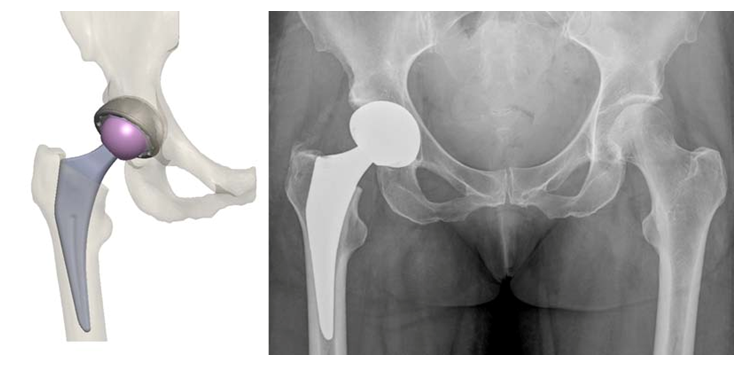Dr Sanjeev Gupta has a special interest in treating hip pain, with particular expertise in hip surgery including hip fractures, hip replacement and revision hip replacement procedures.
He is fellowship trained in performing complex primary hip replacement surgery and revision hip replacement surgery. He has trained in performing a variety of hip approaches (including the anterior hip replacement approach), however the decision making for the best approach is tailored to each patient.
Dr Gupta is very involved in exploring all conservative options prior to considering surgery. He aims to provide the best patient care to every patient, with a commitment to providing a trusted evidence based approach to treatment recommendations for the best outcome.
Who may benefit from a total hip replacement?
A total hip replacement is a surgical solution for patients who suffer severe hip pain and are limited in their mobility as a result. Surgery is recommended once non-surgical options are no longer working.
There are several causes for hip joint disease. The most common cause is osteoarthritis, which is a degenerative condition that worsens with age. Other causes include rheumatoid arthritis or avascular necrosis, which is a condition in which the blood supply to the bone is lost.

What are the success rates of surgery?
Hip replacements are generally successful (>97%) in alleviating pain, and improving mobility.
What is involved in the procedure?
The hip joint is made up of two parts: the “ball” which is the top part of the femur bone, and the “socket” which is the corresponding part in the pelvis bone. A total hip replacement (THR) involves replacing both the ball and socket parts of the joint.

The procedure generally takes 1-2 hours. The procedure is usually conducted under a spinal Anaesthetic with sedation, or a general Anaesthetic will be performed. Prior to surgery, the anaesthetist will discuss your medical history and details of your Anaesthetic with you.
During the operation, multiple trials are made prior to inserting the definitive hip replacements. Several checks are made to ensure full range of motion, equal length of the legs, and no excessive tension in the muscles.
What type of surgical approach will be used?
There are several ways of approaching the hip joint. In general, most approaches have similar results. Each approach has advantages and disadvantages. Dr Gupta will discuss issues relating to surgical approaches with you during your consultation.
Dr Gupta has been trained in the anterior surgical approach to the hip. This approach often allows earlier recovery (only in the short term), but this approach is not suitable in all patients.
What type of prosthesis will be used?
The condition of the existing hip bone will determine whether special bone cement is used to fix the prosthesis in place or whether no cement is used. Most patients have sufficient bone stock to accept an uncemented acetabular and femoral component. The types of hip replacements used all have survivorships of greater than 95% at 15 years, usually longer.
Dr Gupta will discuss the type of hip replacement with you during the consultation.
Following insertion of the acetabular and femoral components, a fitted lining is inserted. The type of lining used will depend on the particular patient, but is generally made from medical grade polyethylene or ceramic material.
What happens after the total hip replacement?
A total hip replacement procedure normally involves a hospital stay of 3-4 days. Most patients are encouraged to get out of bed and walk around for short periods on the same day of surgery, with supervision by the physiotherapists. Patients are given a set of exercises to follow which will help strengthen the hip joint and restore a good range of motion over time.
General daily activities can normally be resumed three to six weeks after the procedure. Most patients can drive after 4 weeks, often sooner. This will depend upon your progress, and your need for pain medications. You should not drive if you are taking medications that affect your ability to drive.
Any heavier physical activity, such as sport, will need to wait a little longer. We generally recommend to avoid contact sports, although we encourage you to maintain your health with other activities. Sports including bowls, golf, skiing and tennis are all encouraged. Dr Gupta will advise you on this.
What are the risks of the procedure?
There are several risks of surgery. This includes general risks of any operation, in addition to specific risks of hip replacement.
The risks of hip replacement include:
- Infection
- Blood clots (deep vein thrombosis and pulmonary embolism)
- Pain / Tendonitis
- Dislocation (<1% risk)
- Leg length discrepancy
- Loosening / Fracture
- Revision surgery
In general, most of these complications are uncommon, and will be discussed with you during the consultation.
Please click on the link below for further information:
- Hip Bursitis
- Inflammatory Arthritis of the Hip
- Osteoarthritis of the Hip
- Osteonecrosis of the Hip
- Activities After Hip Replacement
- Anesthesia for Hip and Knee Surgery
- Hip Conditioning Program
- Minimally Invasive THR
- Preventing Blood Clots After Orthopaedic Surgery
- Total Hip Replacement
- Total Hip Replacement Exercise Guide
- Hip Fracture Prevention
